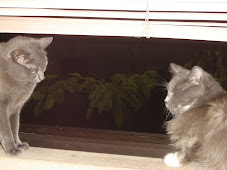
Evaluating sources should never be underestimated because it enables us to start working properly on what we have to write, whether a theses or an essay. If we manage to find sources that are interesting and worth reading, we’re starting off on the right foot. The problem is not only to judge material, but also to know what and where we have to search for. In order to write my theses one year ago, I did research in many libraries and I surfed the Net. I think that the Internet is more and more used by people in order to find helpful material because online sources are often updated regularly. Anyway, the Internet is an overwhelming context; it provides us with a lot of information and sometimes it can be very difficult to choose websites.
Now I'll tell you the steps I've always taken and the criteria I have used and I’ll still use in the future in order to find helpful online sources.
For my search I always use Google, but if I have to find blogs dealing with the topic I’m interested in I prefer using Technorati. Whereas Google concentrates on websites in general, Technorati is a search engine focused on blogs. Nowadays it’s indeed very common to find blogs that deal with specific subjects and are worth reading.
When I use Google or Technorati I always try writing different keywords in order to find what I want. When I finally find many websites which seem interesting, I try to evaluate them through my criteria.
For example, let’s talk about Google.
First, when I’m in front of a list of potential interesting sites, I read the title of the sites and the few lines where my keywords are included.
Second, I look at the url of the sites (I also learnt what the domains are and how to check them). If the urls are very long, it means they’re not homepages. If they have odd names I consider them unreliable.
Third, I click on the button ‘copia cache’ placed near the websites I’m still interested in. This function was created to enable people to visit the sites even when they're not available. I found it useful because it also highlights my keywords within the sites so my search becomes very easy.
When I visit the sites I always try to search for the author (if there isn’t the author I consider them not very reliable), to understand if it’s updated regularly (if it uses RSS feeds too), and to look at the layout. The websites should be well-organized. For example, they should be divided into sections, and they should contain useful links to the sections within the site. They should not have many banners or ads as well.
Then, I search again for the information contained in the websites. If it is a blog, I try to look at the amount of information (if it has only few posts, it’s not very helpful) and to read if there’s something worth considering. If the websites are interesting, the amount of the information is huge and can be found very easily, I consider the websites useful sources.
Here are the criteria I use to do research in libraries.
I concentrate on the author and I always try to get information about her/his previous writings. In order to do this, I have a quick look at the bibliography, and at the brief summary of the author’s life and career. This kind of information is usually available on books. Then I look at the index, which contains the contents of the book. The books are usually rated. Sometimes they can be highly rated by experts, and this can be useful to understand if the sources are reliable. The book shouls also be updated.
Now let’s consider criteria advised by three different websites: the
The tips given by the
This site provides me with a lot of interesting questions to ask myself and it deals with online sources and written sources. The site deals with many topics, such as authorship, goals, access. I think that it’s important to know who the author of a website or a book is. Anyway, the site advise people to ask themselves a lot of questions such as ‘What has the author written in the past about this topic?’ or ‘Did a teacher or librarian or some other person who is knowledgeable about the topic mention this person?’ As for online sources, I think that sometimes it’s difficult to find information about the author’s previous writings. Nowadays more and more people collaborate to create websites, and if they haven’t written something interesting before, this doesn’t mean that the website we’re judging is not trustworthy. I find that it’s useful to look if there’s a brief summary of the author’s life. As for written sources, we have always to search for the author’s previous writings. It is possible thanks to bibliographies and book lists, which are available in the libraries. If we still don’t know what the author has written, we can use a search engines to find material.
The OWL advises to check the aim of the website (or of the book) too. That’s is very useful! I appreciated especially the section about audience. The audience of a site/book is very important. If we know the target, we also know the aim of the site. As I mentioned among my criteria, the OWL wrote that it’s important to check the domain of the site as well. I didn’t know that ‘.com’ domain means that the site wants to sell or promote something! Great! I will take advantage of this suggestion!
I also appreciate what the OWL wrote about the accuracy of information, especially about rating. For example, if the site has been highly rated by a reputable rating group, the site can be considered reliable. True!
This site provides useful questions, like the other website I wrote about. I appreciate especially the question about plagiarism, which I didn’t mention among my criteria. Information can be often copied and pasted from site to site and we can’t know if it’s authentic. I didn’t think of how to contact the author. This is a helpful criterion. It can be useful to find an e-mail in order to interact with the author. I will profit from this suggestion!
These are the criteria I have used and I’ll use.
I hope you’ll find them interesting! Have a look at Easley Library-Bluefield College. I find it helpful.
Let me know!
Giovanna
(photo source)










